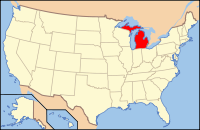Antrim County, Michigan
| Antrim County, Michigan | |
|---|---|

Antrim County Courthouse
|
|
 Location in the U.S. state of Michigan |
|
 Michigan's location in the U.S. |
|
| Founded | 1840 |
| Named for | County Antrim |
| Seat | Bellaire |
| Largest village | Elk Rapids |
| Area | |
| • Total | 602 sq mi (1,559 km2) |
| • Land | 476 sq mi (1,233 km2) |
| • Water | 126 sq mi (326 km2), 21% |
| Population | |
| • (2010) | 23,580 |
| • Density | 50/sq mi (19/km²) |
| Congressional district | 1st |
| Time zone | Eastern: UTC-5/-4 |
| Website | www |
Antrim County is a county located in the U.S. state of Michigan. As of the 2010 census, the population was 23,580. The county seat is Bellaire. The name is taken from County Antrim in Northern Ireland.
YMCA Camp Hayo-Went-Ha, the oldest American summer camp that sits on its original site, occupies about one square mile on the shore of Torch Lake in Central Lake Township. Boys first attended Hayo-Went-Ha (variant of Hiawatha) in 1904.
The county was formed in 1840 as Meegisee County. Meegisee (meaning "eagle"), was the name of a Chippewa chief who signed the 1821 Treaty of Chicago and the 1826 Treaty of Mississinwas.
It was renamed Antrim County in 1843, one of the Irish or Scots Irish names given to five renamed Michigan counties at that time, supposedly in deference to the increasing number of settlers of Irish and Scots Irish heritage in Michigan at that time. In the text of the 1843 legislative act, the name was misspelled as "Antim".
Separate county government was organized in 1863. The county seat was originally located in Elk Rapids, but was moved to Bellaire in 1904 after 25 years of litigation. In 1950 its population was 10,721.
According to the U.S. Census Bureau, the county has a total area of 602 square miles (1,560 km2), of which 476 square miles (1,230 km2) is land and 126 square miles (330 km2) (21%) is water.
The county is considered to be part of Northern Michigan. Glaciers shaped the area, creating a unique regional ecosystem. A large portion of the area is the so-called Grayling outwash plain, which consists of broad outwash plain including sandy ice-disintegration ridges; jack pine barrens, some white pine-red pine forest, and northern hardwood forest. Large lakes were created by glacial action.
...
Wikipedia
